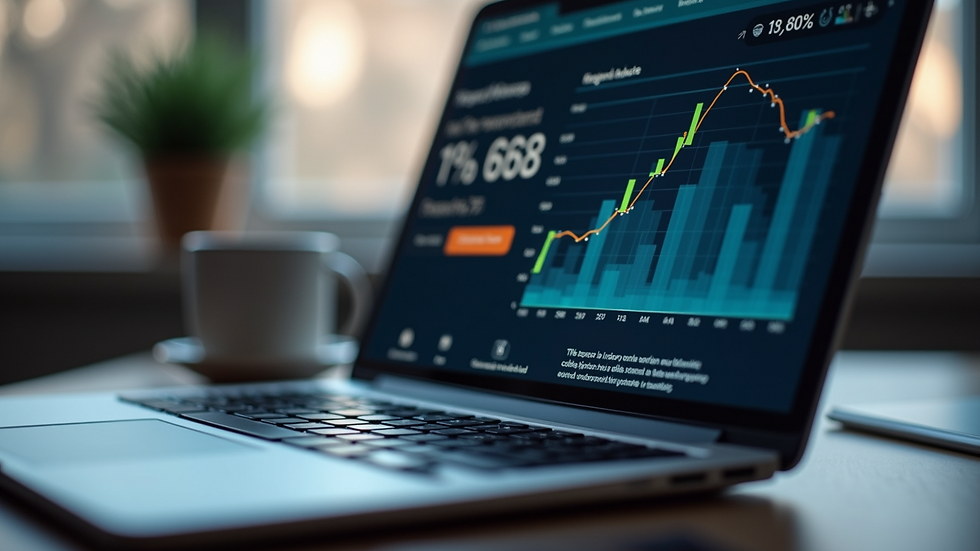The Basics of SEO
- Ali
- Jun 6, 2025
- 4 min read
Updated: Aug 11, 2025
Search Engine Optimization, or SEO, is essential for anyone looking to establish a successful online presence. In a world where billions of searches occur daily, knowing the fundamental principles of SEO is more important than ever. This blog post will guide you through the basics of SEO, supplying you with the knowledge needed to navigate this critical field effectively.
What is SEO?
SEO is the practice of optimizing a website to improve its visibility in search engines like Google. When users enter queries, these search engines rely on sophisticated algorithms to return the most relevant results. The goal of SEO is straightforward: ensure that your content ranks high in the search results for relevant terms.
Why is SEO Important?
SEO plays a vital role in increasing organic traffic. According to recent studies, about 53 percent of all website traffic comes from organic searches. When your website appears in the top search results, you increase your chances of converting visitors into customers. An optimized site not only attracts more visitors but also enhances the user experience, a critical factor in retaining customers. Research shows that 88 percent of online consumers are less likely to return to a site after a poor experience.
Key Components of SEO
Keyword Research
Keyword research is the backbone of any SEO strategy. This process involves identifying the keywords and phrases that potential customers use when searching for products or services related to your business. Tools like Google Keyword Planner and Ahrefs can reveal valuable targeting keywords. For instance, using long-tail keywords can result in 8.5 times more clicks because they are more specific, making it easier to attract the right audience.

On-Page SEO
On-page SEO involves optimizing individual web pages to rank higher. This includes creating high-quality content featuring targeted keywords, as well as optimizing title tags, meta descriptions, header tags, and URLs. For instance, an effective title tag should include the primary keyword and be between 50-60 characters long to ensure it displays correctly on search engine results pages.
Off-Page SEO
Off-page SEO pertains to actions taken outside your website that impact your ranking. A primary component of this strategy is backlink building, which involves acquiring links from reputable websites to boost your site’s authority. For example, websites with strong backlink profiles can see a 93 percent increase in organic traffic.
Understanding Search Engine Algorithms
Search engine algorithms dictate how pages are ranked in search results. While these algorithms are not public, they generally prioritize content quality, relevant keywords, site speed, mobile optimization, and user engagement. Keeping up with algorithm updates is crucial; they can significantly affect your site's visibility.
Technical SEO
Technical SEO concentrates on the backend aspects of your website. Essential components include improving page speed—studies show a one-second delay in loading time can result in a 7 percent loss in conversions—ensuring mobile-friendliness, using SSL certificates for security, optimizing XML sitemaps, and implementing structured data to help search engines understand your content better.

Local SEO
For businesses operating in specific regions, local SEO is crucial. This process optimizes your online presence for local searches. Strategies include claiming your Google My Business listing, encouraging customer reviews, and including local keywords in your content. Research indicates that 46 percent of all Google searches are local, highlighting the need for effective local SEO.
Content is King
Quality content is a cornerstone of SEO. Regularly publishing informative articles or blog posts not only establishes you as an authority in your field but also keeps your audience engaged. Content that answers questions and solves problems is more likely to be shared, resulting in valuable backlinks and increased visibility. According to HubSpot, companies that prioritize blogging see 13 times more ROI than those that do not.
Measuring SEO Success
Tracking your SEO efforts is vital for understanding effectiveness. Google Analytics is a powerful tool for gaining insights into traffic sources and user behavior. Monitoring keyword rankings and search engine results can help you adapt your ongoing SEO strategy effectively. For instance, regularly checking your site’s performance can reveal trends that inform future optimizations.
Common SEO Mistakes to Avoid
Ignoring Mobile Optimization: With over 50 percent of web traffic coming from mobile devices, not having a mobile-friendly site can drive visitors away.
Neglecting Meta Tags: Title tags and meta descriptions are essential for improving click-through rates. Optimizing these elements can significantly boost traffic.
Keyword Stuffing: While including keywords is important, overloading your content with them can result in penalties. Always ensure your writing flows naturally.
Failing to Update Content: SEO is an ongoing process; regularly updating old content can enhance performance and relevance.
Overlooking Analytics: Failing to monitor results hinders your ability to refine your strategy. Keeping track of metrics is essential for success.
Wrapping Up
SEO can seem overwhelming, but with the right knowledge and tools, anyone can grasp the basics. By focusing on essential components like keyword research, on-page and off-page optimization, and the creation of quality content, you can significantly improve your website’s visibility. This not only attracts more visitors but also improves user experience and builds your site’s credibility. Remember that SEO is a long-term endeavor. Stay patient, keep learning, and watch your online presence flourish!



Comments